SALVATIONIST
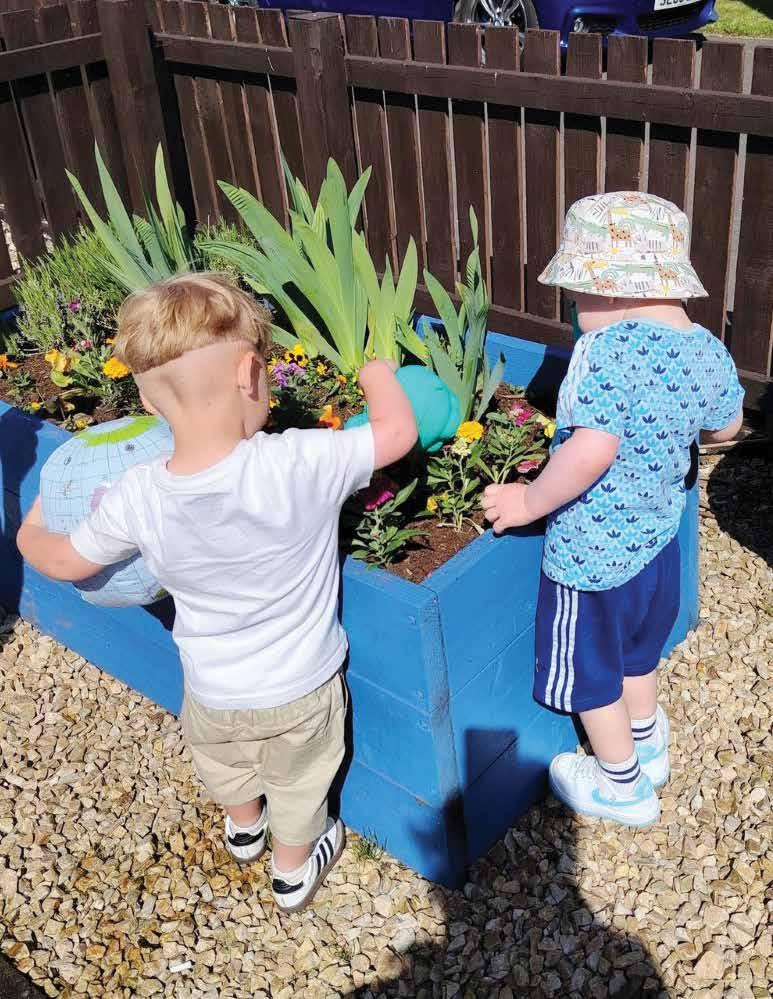


THE three words above have been the official motto of the Los Angeles police department since 1963 and have been adopted by many others since. They have been made internationally famous by countless police dramas in which the veracity of this intent is often put to the test. Living up to what we claim to be striving for is a challenge that we all face, particularly as Christians.
In this week’s issue we are revisiting our territorial mission priority to care for creation. This intent involves the practice of protecting our planet however we can. In so doing we are seeking to serve both God and those whose survival and wellbeing are perhaps more deeply affected when the environment is damaged.
The mission priority states that The Salvation Army is committed to helping change attitudes resulting in a more responsible use of our planet. We seek to provide practical care and advocacy for people affected by damage to the environment. People will not experience fullness of life unless God’s creation is protected and cared for.
Living up to what we claim involves changing attitudes, our own as well as other people’s. Change starts with me.

MAJOR JULIAN WATCHORN Editor


Harvest Donate online
Impostor syndrome Finding strength in God’s unconditional love

To subscribe, speak to your
leader or visit




Issue No 2029
EDITOR Major Julian Watchorn
MANAGING EDITOR Ivan Radford
ASSISTANT EDITOR Stevie Hope
EDITORIAL ASSISTANTS Major Margaret Bovey, Major Lynne Shaw, George Tanton, Lyn Woods
SENIOR DESIGNER Hannah Holden
GRAPHIC DESIGNERS
Joseph Halliday, Louise Phillips
PROOFREADER Chris Horne
CONTACT US 020 7367 4890
salvationist@salvationarmy.org.uk
ADVERTISING advertising@salvationarmy.org.uk
DISTRIBUTION AND SUBSCRIPTIONS
Salvationist Publishing and Supplies (Periodicals), 66–78 Denington Road, Wellingborough NN8 2QH 01933 445445 / subscriptions@satcol.org
FOUNDERS Catherine and William Booth
INTERNATIONAL LEADERS
General Lyndon Buckingham and Commissioner Bronwyn Buckingham
TERRITORIAL LEADERS
Commissioners Jenine and Paul Main
EDITOR-IN-CHIEF Major Julian Watchorn
TERRITORIAL HEADQUARTERS
1 Champion Park, London SE5 8FJ 0845 634 0101
© The Salvation Army United Kingdom and Ireland Territory. ISSN 2516-5909.
The Salvation Army is a Christian church and registered charity. The charity number in England, Wales and Northern Ireland is 214779, in Scotland is SC009359 and in the Republic of Ireland is CHY6399.
Published weekly by The Salvation Army and printed on paper from sustainable sources by CKN Print, Northampton.
@SalvationistUKI
@SalvationistUKI


As the 2025 Women’s Rugby World Cup continues, Lieutenant Rachel Furlong reflects on the unsung heroes on the pitch
THIS year has seen several high-profile women’s sports tournaments, from the Lionesses winning the Euros to the Hundred and, later this year, the ICC Women’s Cricket World Cup, as well as tennis, athletics and swimming to name just a few. Last month, the Women’s Rugby World Cup joined the list, this year hosted in England. This weekend sees the competition reach the quarter-final stage, with Scotland, England and Ireland all still in contention.
Each nation has its stars, with faces known to both avid fans and more casual rugby followers. But, unusually, the famous faces in this tournament often belong not to the players but to the officials. Names and faces such as Scotland’s Hollie Davidson, England’s Sara Cox and South Africa’s Aimee Barrett-Theron, who famously said last year in a men’s under-20s match: ‘I’m not mad, I’m just really disappointed.’ These referees are recognisable to most rugby fans around the world, meaning they have a higher public profile than many of the players they are officiating.
This places them in an uncomfortable position. Each rugby match official, from amateur referees like me to those managing high-profile games, has the same end goal of making sure that
nobody is talking about them: a good game for a referee is when the game has been played safely, officiated fairly and nobody remembers you. While they’re running around with the whistle and making the calls, referees want the focus to be on the game, not them.
As a Salvation Army officer, I see many people in corps who go about their jobs with a similar attitude – members who participate behind the scenes so that others can serve. They might clean the toilets, put the bins out or phone and visit those who are lonely. These inconspicuous roles happen every week in corps and centres up and down the territory. They carry out these acts of service hidden away from public recognition, not doing it for personal glory, but because it is their service to the Lord.
We read in 1 Corinthians 12:4–6 about the spiritual gifts given to the Church and how they are held in equal value: ‘There are different kinds of gifts, but the same Spirit distributes them. There are different kinds of service, but the same Lord. There are different kinds of working, but in all of them and in everyone it is the same God at work.’
As Salvationists, we go about our service to the Lord, be that a very public or hidden ministry, knowing that God sees and values equally all that is offered
Read 1 Corinthians 12:4–6. What gifts has God given you? What gifts has God given those around you?
How can you offer your gifts in the Lord’s service? How can you encourage others in offering theirs?
Do you serve God for his recognition or the recognition of other people?
to him in love. Whether we are hoovering an entrance hallway or preaching, we are offering our time, talents and gifts in his service.
And so, as the Women’s Rugby World Cup enters its final stages, and the match officials take to the field, see if you can spot the officials as they go about their work, and ponder who in your corps setting goes about their role avoiding the attention but serving God in their own unique way.

LIEUTENANT
RACHEL FURLONG
Corps Leader Isle of Wight
seconds with...
Lifehouse
/lʌɪfhaʊs/ ■ n.
IN the UK and Ireland Territory, The Salvation Army currently operates 77 Lifehouses, accommodating more than 3,000 people every night.
A Lifehouse is a supported residential accommodation facility for people experiencing homelessness. They are places where people can get support with their housing issues while getting help with things such as employment, debt, training, spirituality, loneliness, addiction and mental health.
The aim of a Lifehouse is to help people regain skills and the confidence to live independently.
There is a range of types of Lifehouse, each specialised for different people groups. These include: single people, young people, vulnerable women, families with children, ex-service personnel, people who are sleeping rough, people with physical and mental health issues, people with drug and alcohol issues, people involved with the criminal justice system, and people with no income or no recourse to public funds.
Lifehouses are person-centred – putting the individual in charge of the process – with a strong focus on harm reduction interventions and trauma-informed approaches. This means, Lifehouse employees are always trying to look at things from the service user’s perspective.
As stated on salvationarmy.org. uk, we call these places ‘Lifehouses’ because they are more than a place to stay.
• Learn more about Homelessness Services at salvationist.org.uk/ territorial-directory/ homelessness-services
‘I know I am covered with God’s mighty wings’
Enabled member Annmarie Batty (Hull Icehouse) testifies that she can put her hope in God
AFEW years ago, I received a cancer diagnosis, and then two more. I was diagnosed with breast, endometrial and ovarian cancers. A cancer hat-trick, but all treatable.
The Macmillan Cancer Support nurse who helped me at the time asked how I felt. All I could think of at the time was that it was like being on a helter-skelter – going round, having no control with no awareness of when it would stop.
This year, during a check-up, I was informed that the breast cancer had returned. I have had three operations, radiotherapy and drug treatment.
A friend asked how I felt. At first, I said angry and frustrated that it was back. But then I realised, this time the experience was very different.
I no longer feel as if I am sat on a mat going round and round and lower and lower. I am more like the paralysed man in Luke 5:17–26.
In the story, the man cannot reach Jesus under his own effort. His friends carry him to where Jesus is. When the crowds obstruct their way, the friends remove the roof and lower him into Jesus’ presence.
Today, the four friends supporting me are the NHS, the Macmillan nurses, my family and my church family. I am lying on a bed of faith under the cover of prayer. My physical, mental, spiritual and emotional needs are all being met.
Reuben Morgan’s song ‘Still’ says this:
Hide me now
Under your wings
Cover me
Within your mighty hand
When the oceans rise and thunders roar
I will soar with you above the storm Father, you are King over the flood I will be still, know you are God
Psalm 62:5–7 reminds me: ‘I depend on God alone; I put my hope in him.
He alone protects and saves me; he is my defender, and I shall never be defeated. My salvation and honour depend on God; he is my strong protector; he is my shelter’ (Good News Bible).
When the paralysed man met Jesus, the first thing that Jesus did was forgive his sin. So I know it is well with my soul. I know that Jesus can handle my frustrations, my feelings and my weakness because he knows what it is like to be human. I know I am covered with God’s mighty wings and safe in his care.
Praise God!
Have you got a testimony to share? We’d love to hear your faith story! Get in touch at salvationist@salvationarmy.org.uk
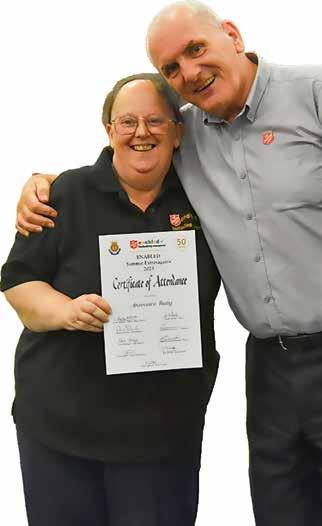

To a farm go all the labourers, in a barn they gather there. Now the farmer they are meeting, telling him how much they care.
He is told that he’s the greatest, praised for everything he’s done. Then they make their needs known to him, he will answer every one.
Some will stand there testifying how he’s helped them on their way,
To him then a song they’re singing, O it is a happy day.
Now the foreman is suggesting like this man they all should be. Isn’t he the best example? No one there will disagree. Ending with more happy singing finally they all go home.
Sadly though the crops are rotting, unattended, left alone.
This is just like many churches, what will be the final cost?
Like that farm there could be closure for the harvest has been lost. It is good inside to worship, but to win souls don’t be slow, Outside’s where the action’s needed, for the Lord’s command is ‘go’.
BRIAN COLLEY CLOWNE
Lord, fill the clay with treasure so that growth results in fruit;
A love for all our neighbours brings the first emerging shoot. Exuberance for life, and a new sense of joy impart; A peace that brings serenity to every anxious heart.
We always have enough to eat, and rarely face a drought But often overseas we find, there’s not much rain about.
Those who have too much food to spare, must be prepared to give
Some of their goods to those with less, so they can also live.
We must not consume to excess, ev’n if we find we can
For there are those with less than us, they are part of God’s plan
We must also clean up our Earth, ignored for many a year
We need to be good stewards of all things so far and near.
For our children we must provide so they can breathe clean air
And they continue our good works with due concern and care.
WESLEY PAXTON LOCKERBIE
In nature’s splendid solitude I often walk, through fields and wood, Gazing with humility
On all that God bestows on me. From buds out-thrusting on the trees To butterflies and fresh green leaves.
I look in awe as skylarks dance Above me in their spring romance. While on the branch and in the hedge Nests are built on every ledge.
Lord God, in this your hand must be. Amazing, wondrous mystery.
Lord, may I never fail to see The wondrous things surrounding me. To roam with freedom in the land Created by your mighty hand. Eternal God; creator King, Thanks for each and everything.
JAMES CASSIDY READING CENTRAL
A patience long-enduring, trusting all is in good time; Compassion and true kindness, as the branches grow and climb. Perfect our moral compass to be drawn to all that’s good; Bring faithfulness and loyalty as only Jesus could.
A gentleness of nature as the canopy spreads wide; And self-control enabled by your power and strength inside. The harvest ripe and ready for the world to taste and see; A humble gratitude to know God’s fruit can grow through me.
EMMA DAVIS CHATHAM

WHAT an irritating prayer the Lord’s Prayer is! Right at the heart of the Sermon on the Mount – or what theologian Dallas Willard calls a ‘curriculum for Christlikeness’ – we find a way of praying that refuses to tolerate superficiality, encourages a depth of relationship with God, and invites us into ongoing transformation. Here is a prayer to get under your skin, to confront and challenge anything that displaces God from his rightful place.
This prayer is not comfortable – it’s not meant to be. It’s meant to realign us with the heart of God. If we don’t allow it to irritate us, this prayer that was introduced to us as children and recited by rote can easily be reduced to something we digest without reflection. We could find ourselves spending time lamenting the absence of the word ‘trespasses’ and miss the revolutionary invitation to forgive, the transformative call to be shaped by the availability of the Kingdom, the bold summons of surrender, and the profound challenge of dependence.
PAUSE AND REFLECT
What does it mean for a prayer to ‘get under your skin’ in a spiritually healthy way?
How might the Lord’s Prayer be inviting you into deeper relationship, trust or surrender?
What is the likelihood it wasn’t just the disciples who heard Jesus’ teaching on how to pray? When Jesus saw the crowds in Matthew 5:1 and 2, he went up on a
mountainside and began to teach. While the passage doesn’t explicitly mention who was present, it’s likely more than just his closest followers were listening. Pharisees and scribes often followed Jesus as observers and critics. It’s possible some of them were in the crowd or at least heard about his teachings later. Either way, the message was public, and its reach extended far beyond the inner circle.
The leaders of the Pharisees and scribes would have been irritated to hear that God values sincerity over spectacle, that true prayer happens in private and we don’t need to impress God with words. This is the kind of praying that would have got under the skin of anyone for whom relationship with God was merely about controlling outward behaviour rather than pursuing true inner transformation.
PAUSE AND REFLECT
How does the Lord’s Prayer challenge tendencies you have towards outward displays without inward transformation?
Which part of the Lord’s Prayer feels most uncomfortable or confronting?
Having set the scene, Jesus says: ‘This, then, is how you should pray’ (v9). In a 2016 call to prayer for Thy Kingdom Come, former Archbishop of Canterbury Justin Welby described this prayer as: ‘Famous enough to be spoken each day by billions in thousands of languages… It’s simple enough to be memorised by small children and yet profound enough to sustain a whole lifetime of prayer.’
Theologian Søren Kierkegaard once wrote: ‘The function of prayer is not to influence God, but rather to change the
nature of the one who prays.’
The Lord’s Prayer, when prayed and digested, has the potential to transform us each day, presenting a way of living and understanding that ensures we know what it is to be one with God. The values embedded in it reflect a radically different way of being, one rooted in service, love, surrender and trust. They invite us to live in the reality of God’s Kingdom, not the illusions of power or self-sufficiency. They draw us into a life not shaped by the world’s default settings of ego, vengeance and domination but the way of Jesus.
To pray ‘our Father’ is to step into an intimate and awe-inspiring relationship with God. It invites us to see God not as distant, but as holy and present in the everyday, to live as his beloved children. ‘Hallowed be your name’ are not just words of reverence. We are asking for our lives to reflect God’s beauty and holiness in a world that often celebrates selfpromotion over sacredness.
In what ways are you living as a beloved child in God’s presence?
Where might you be invited to honour God more deeply in your daily choices?
To pray ‘Thy Kingdom come, thy will be done’ is a radical reorientation. Resisting the dominant story of control, it opens to us the availability of God’s Kingdom here and now. We are invited to participate in something bigger than ourselves, a divine movement of justice, mercy and peace. Our surrender to God’s will is a courageous act of trust, reshaping how we relate, work and rest.


It asks us to depend daily on God’s provision for the sustenance of our whole being.
PAUSE AND REFLECT
How are you participating in the life God is making possible around you?
Where are you resisting God’s will, and where are you surrendering to it?
To pray for forgiveness and guidance before recognising God’s glory calls us into revolutionary grace, both given and received. We ask for deliverance from anything that pulls us away from life with God. We remember this is not our story to control. It is God’s Kingdom, God’s power and God’s glory. Our task is to live in that story, faithfully, humbly and with open hands.
PAUSE AND REFLECT
Who do you need to forgive?
Who might you need to ask for forgiveness from?
Are you living as if this is God’s story, not yours?
The Lord’s Prayer is a bold, disruptive invitation into a life shaped by the values of God’s Kingdom. It challenges assumptions, confronts egos and calls us into deeper oneness with God. If we let it, it can quietly get under our skin!

MAJOR GORDON COTTERILL Secretary for Spiritual Life Development THQ


A shortened version of Prayer Matters will continue to be published weekly in Salvationist in 2025. To read the full, unedited booklet, visit salvationist.org.uk/discipleship
SATURDAY 13 SEPTEMBER: CARE FOR CREATION – LAMENTING FOR OCEANS
Polluted sea water is a major concern around the coast of the UK at the moment, not least because of some water companies discharging too much raw sewage into the marine environment. Lord, we grieve the damage these practices cause, and we pray for creative solutions to heal our seas and oceans. by Lyndall Bywater (UKI Boiler Room Team)
SUNDAY 14 SEPTEMBER: SABBATH PRAYER – EXPLOITED
Exodus tells the story of the Israelites in slavery. God uses another to achieve his rescue work – and God will use us too. What can we do? Proverbs 31:8 challenges us to ‘speak up for people who cannot speak for themselves’ and ‘protect the rights of all who are helpless’ (Good News Bible). We each have a voice, and we are challenged to use it. by Major Cheryl Davies (chaplain, Anti-Trafficking and Modern Slavery Department)
MONDAY 15 SEPTEMBER: SHARING THE GOOD NEWS – THE BIG CONNECTION
Pray that the Big Connection continues to bring people together in a spirit of unity and shared purpose, strengthening connections across divisions, churches and communities. Pray that we will resource Social Work Trust projects and local mission, building a stronger, more sustainable future. by Sassi Stuckey-Beeri (Fundraising Officer)
TUESDAY 16 SEPTEMBER: SERVING AND CARING – WELLBEING DEPARTMENT
We pray for the Wellbeing Department regional team, often working in isolation while they support their officer colleagues at times of stress and change. We ask you to bless all initiatives for holistic wellbeing, including the Personify Health challenges, individual mentoring for physical health and nutrition, and plans for Body Mind Spirit enrichment days.
by Major Sarah Evans (Wellbeing Department)
WEDNESDAY 17 SEPTEMBER: GROWING IN FAITH - TERRITORIAL LEADERS CONFERENCE
Gracious God, as leaders gather for the Territorial Leaders Conference, we ask that you bless them with wisdom and unity. Guide their hearts in holy discernment as they seek your will for the Army’s mission. Bless all who participate. May prayer and discussion result in a clear way forward and may all the conversations be rooted in your love and purpose. In Jesus’ name.
by Territorial Leader Commissioner Jenine Main
THURSDAY 18 SEPTEMBER: INTERNATIONAL SALVATION ARMY – NEW ZEALAND, FIJI, TONGA AND SAMOA TERRITORY
We pray for The Salvation Army’s work in such a diverse set of places, and particularly for all those who help keep things connected. We pray God’s blessing on Territorial Commander Commissioner Janine Donaldson and Chief Secretary Colonel Gerald Walker, and we pray for a stirring of hearts to closer relationship with Jesus. by Lyndall Bywater (UKI Boiler Room Team)
FRIDAY 19 SEPTEMBER: JUSTICE AND RECONCILIATION – WORLD PEACE DAY
We pray for lives damaged by violence. We pray for those in authority, that they may bind wounds, heal relationships and find common ground. We pray for a transforming peace, turning fear into trust, pain into hope and doubt into confidence. We pray that world leaders may establish structures for justice, protecting human dignity, enabling reconciliation and building God’s Kingdom. based on a prayer by Sue Cooper from cafod.org.uk
PRAYER REQUESTS
Do you have something or someone you’d like us to pray for?
Email salvationist@salvationarmy.org.uk with ‘prayer request’ in the subject line.

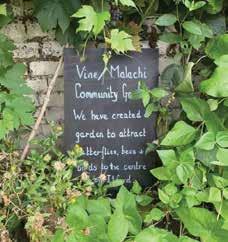
Redbridge borough
How are you finding the processes involved in being an Eco Church?
The eco surveys from A Rocha UK are great as they show us ways to do things and remind us of what we can do. We completed surveys for Ilford and Woodford, and both have been awarded Silver. We are about to reclaim another space at the side of the hall at Ilford, to grow herbs for cooking classes and our brunch drop-in. We have a new community garden at Woodford and are working on an ecumenical environmental project. We have also grown vegetables in the garden at Malachi Place.
How are your corps and community engaged in caring for creation?
There is a massive shift in thinking, culture and how we do everything, especially among staff and volunteers. We’re also aware that, as we embrace the territorial mission priorities, it needs the same amount of focus as the others.
Have you made progress as an Eco Church?
We’ve moved from Bronze to Silver and set up a team for Eco Church matters.
What could help you on your journey?
The surveys are great for making you think and see what you can do. We encourage people to do them!
How are you finding the processes involved in being an Eco Church?
Our church and community are a hive of activity, so it can be hard to find time to complete the online surveys from A Rocha UK in such a busy place. That doesn’t stop us striving to be more environmentally friendly.
How are your corps and community engaged in caring for creation?
We believe in leading by example – so we’d like to think this transfers into people’s personal spaces too. There has to be a willingness to go the extra mile to care for creation.
Have you made progress as an Eco Church?
Definitely. We’ve made good progress since our Bronze award. We’re praying that a new boiler/heating system will be installed at our corps and that we may then qualify for Silver.
What could help you on your journey?
We’re always in need of more volunteers, especially in the garden we’re so blessed to have. We’re thankful for our community and all their input to support what we do.

✔ Collect and recycle soft plastic at supermarkets
✔ Use double-sided printing on recycled paper
✔ Walk, cycle or take public transport where you can!
✔ Turn an unused outdoor space into planters
✔ Use old water for plants – don’t tip it away
✔ Start a clothing bank
Find out more about registering as an Eco Church at salvationist. org.uk/environment

Penzance
Have you made progress as an Eco Church? In February 2024, we received a Bronze award, recognising our efforts to encourage environmental responsibility among everyone who uses our hall, including weekly group users. We installed LED lighting, which has reduced greenhouse gas emissions. We’ve also seen significant improvements in recycling, including food waste. We plan to conduct another eco survey in 2026.
How are your corps and community engaged in caring for creation?
Read more Eco Church journeys online at salvationist.org.uk/ eco-church-stories
Our new courtyard garden, The Sanctuary, provides a peaceful space that attracts birds, insects and butterflies. It has had a profound impact on wellbeing for all. We are now preparing to plant bulbs and other plants.
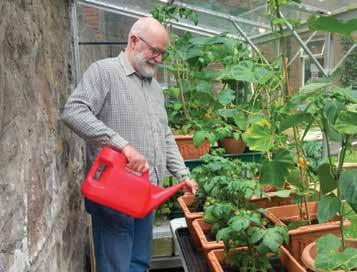
Adding a splash of colour is the brainchild of Lifehouse employee Steve Smith. He undertook the renovation of a small area outside the building and transformed it with flowers and a greenhouse.
Clients are warmly encouraged to plant, tend to and enjoy the area. In Steve’s words, it ‘softens’ a landscape where concrete is the norm. It also brings an element of creativity into lives where landscapes have been hardened by circumstances.
‘Our programme is designed to help our clients craft a new sense of self, renew their sense of independence and control, and realise their potential as members of the community,’ he explains.
The benefits of the project also touch on mental health. The space offers clients an opportunity to express themselves and see the fruits of their labour.
Care for Creation on iLearn

A new environmental awareness course is available on iLearn. So far, a quarter of those who have taken it are connected to a Lifehouse. If you have a Salvation Army email address, why not take the course yourself today?
What is a Lifehouse? Check out
The Salvation Army Explained on page 4!
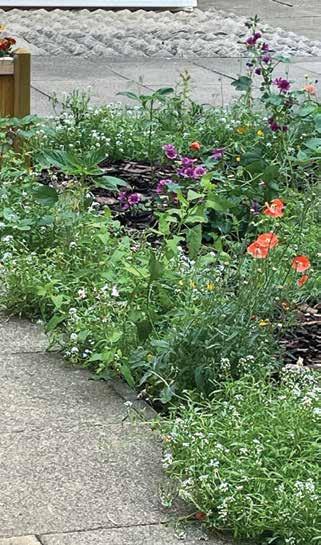
A resident said he would like to do something with the mud patch outside the residents’ communal hub. He dug it out and then – with plant donations, plants moved from other areas around the building and wildflower seed packets from THQ – he produced an amazing garden space for the enjoyment of everyone!
He is completely focused on recycling and reusing for his creations and went on to make a bird bath using old towels donated by a nearby hotel. The white fence he is putting around the garden is made from wooden pallets that found their way to the Lifehouse with deliveries. It is a work in progress, but it’s a little bit of nature that we have here in Whitechapel.
The Lifehouse introduced five chickens – Sporty, Ginger, Scary, Posh and Baby – in 2024. They recently incubated a clutch of eggs and now have five egg-cellent chicks to add to the family.
The chickens provide residents with a boost to their wellbeing and mental health, as well as a routine – and fresh eggs! Staff and residents muck in with keeping the coop clean and bringing the chickens in at night. Assistant Support Worker Wayne is also known as the Chicken Whisperer after training the chickens to come in at night!
‘We’ve used the births as an opportunity to talk about new life, transformation and hope with our residents,’ explains chaplain Captain Diane Taylor.
‘Lifehouses don’t just provide a room for somebody to sleep in,’ she continues. ‘It’s about engaging people to help them move on from homelessness. Having the chicks has brought a real sense of hope and optimism to the place.’
One chick hatched in Support Worker Jodie’s hands. She said: ‘It was one of the most uplifting and magical experiences I’ve ever had.’
A group of 16 to 25-year-olds from the corps spent a memorable weekend retreat delving into the theme Our World – Is It Broken?. The weekend began with a special trip to Moffat Community Observatory to gain a new perspective on the scale and wonder of God’s creation. The following day focused on the environmental challenges our planet faces. The young people explored a biblical understanding of creation care beyond Genesis 1:28 and Genesis 2:15, including Psalm 104 and Romans 8:22 and 23, which speaks of creation groaning under the weight of human actions, as well as Jeremiah 2:7 and Numbers 35:33, which condemn the pollution of the land.
The group reflected on humanity’s role not as owners but tenants and stewards of God’s Earth. This theological foundation provided the context for a scavenger hunt. This
hands-on experience served as a reminder of the world they are called to protect and cherish.
On Sunday the group took to Moffat’s high street and interviewed locals about their eco journeys, causing quite a stir!
The final discussion centred on how they could translate their newfound insights into meaningful action as an organisation, as families and as individuals. They are now moving forward with plans and registering with Eco-Congregation Scotland.

Earlier in the year, we went on a Creation Walk in the area around the hall. Activities included litter picking, trying to find natural things to match a colour chart, and finding something to go with each letter of the word ‘creation’.
Monty, 10, said: ‘It was fun, I found lots of litter and was happy that I could pick it up so that the wildlife wouldn’t get hurt. I was sad that people had dropped so much litter and hadn’t put it in a bin or taken it home. I know that God made the world for us to live in and that some people don’t try hard to look after it.
It was also nice to walk with my friends and my dog, Uhtred, because he is part of God’s creation.’ Maxwell, 9, said: ‘I like challenges, so I tried hard to find something for each letter. The letter “t” was easy because I saw lots of trees, but I found “c” and “n” more difficult. It made me think about all the different things that God has created to help us have a happy life. My favourite part was walking over the bridge and along by the river. I am thankful for where I live because I get to see lots of nature and wildlife. I want to try my best to look after it.’

The Kids Alive group and toddler group were given a raised planter each to look after. The Kids Alive group have been learning about where food comes from and planted vegetables to make their meals at the club. This year we have planted peas, lettuce, beetroot, cauliflower and potatoes. Last year we grew carrots that were purple, red and yellow! The children enjoyed working out whether the different colours of carrot tasted different and if lettuce from a shop tasted different from the one that they grew. The potatoes were grown in bags as well as in the planter and some of the children asked their parents if they could grow potatoes at home. The toddler group planted flowers. The toddlers loved watching them grow




and watering the plants. They chose plants good for butterflies. We had stories and crafts about caterpillars and butterflies, and they cared for some caterpillars in a butterfly garden. They watched them grow, before releasing the butterflies in the garden. The corps took part in No Mow May, which allowed wildflowers to grow in the grass. The Kids Alive group loved seeing how many different flowers they could find. The toddler group liked seeing how many different insects they could find – they were amazed when they found a newt! We are blessed to have a woodland walk behind the hall. We take the children out for walks at different times of the year, and they see the difference the seasons make.

The youth group (Sayac) have taken responsibility for creating and leading the corps land management plan. This will hold the corps accountable to using the small plot of land they have in a way that looks after our environment and encourages others to. The plan includes planting vegetables in planters and grow bags, getting a compost bin, making a bug hotel, planting bee-friendly plants, such as lavender, and installing a bee house.
The young people applied to the Children and Youth Department’s
youth participation fund, and were successful in getting £500 to help set up this project in 2023. Since then, the young people have built and maintained the raised beds, planters and bee hotel. Last year, they also carried out a community litter pick as part of the Keep Wales Tidy campaign in collaboration with other young people from Newport Citadel.
Two years on, the young people continue to maintain the garden along with other members of the corps. The corps has now achieved an Eco Church Silver award.

To encourage young people to engage with caring for creation where you are, download resources from salvationist.org.uk/ environment.
I had the privilege of running the Tree-mendous Makers workshop for the first time, teaching an eager group of young people the importance of caring for creation. I find my relationship with God is deeply enriched when outdoors. Focusing on the tranquillity of nature, the birds whistling, the smell of trees and grass or the sight of insects crawling along the woodland floor really connects me with my faith. I wanted to share this way of worship! I planned a week of bushcraft-like activities intertwined with the theme of each day. We had fire, bug palaces, natural kites, building crosses and much more!

It was a truly inspiring experience watching the children fully immerse themselves in the outdoors and what it means to protect and care for it, while also using what God has provided for us to enjoy ourselves. A lot of these children are not religious. They come to camp with no expectation to leave a ‘Christian’. However, the Lord works in wonderful ways, with some of them embracing God at the foot of the cross we had at the workshop. It was so moving to see them impacted, and I am so grateful The Salvation Army has camps like this. I thank the Lord for creation and how it has touched lives!

WHEN you were young, were you told to finish what was on your plate? Was there any excess to share, any leftovers? I grew up in a large family with five siblings. Something about family time made food quite special: it wasn’t just the food, it was the sharing around the table.
Matthew 14:13–21 tells the well-known miracle of Jesus providing enough food for more than 5,000 people. Jesus withdrew to a ‘solitary place’ (v13), having just heard that his cousin, John the Baptist, had been beheaded during a lavish banquet held by Herod.
The crowds followed him and ‘he had compassion on them and healed their sick’ (v14 English Standard Version). Motivated by love, his ministry was one of healing and healthcare – including addressing their hunger. The disciples wanted to send the crowds away so they could go to the villages and buy food, but Jesus had other ideas. He reasoned: why would the crowd leave when they had something to share? They were to become active participants in a miracle of God’s abundant provision.
Jesus challenged the disciples: give them something to eat. How could they feed this great crowd with only five loaves and two fish? This simple but healthy meal was brought to the Master, who gave thanks, broke the bread and gave it to the disciples to distribute. The disciples witnessed how, when they shared, all ate and were satisfied, and not only that: they gathered up 12 baskets of leftovers. Those leftovers
showed that God provides more than enough for his people.
This miracle is told in all four Gospels. In John 6:12, Jesus says: ‘Gather the pieces that are left over. Let nothing be wasted.’ The disciples were to be good stewards of God’s provision.
The Rev Warren Carter described this miracle as a life-giving feast, a taste of the Kingdom of God, which is often referred to in the Old Testament in terms of an abundant supply of food. It’s about community, joy and sharing together.
Jesus’ actions showed that it is God’s will that hungry people are fed. He anticipated the abundant blessing of good food described by Ezekiel 36:30 and Isaiah 25:6, and echoed the miracles of Elijah multiplying the widow’s meal and oil (see 1 Kings 17:10–16) and Elisha in multiplying the widow’s oil and in feeding a hundred people (see 2 Kings 4).
The first-century Roman empire was marked by significant inequality. Many people knew food insecurity. A small group of ruling elites enjoyed variety and quality of food, but most of the population lived around, at or below subsistence level, with inadequate calorific and nutritional intake. Today, there is still a need to feed the hungry in our world. Social inequality is still evident. There is obesity in the so-called ‘global north’ and malnutrition in the ‘global south’.
The number of people affected by hunger worldwide was as high as 828 million in 2021. And yet Article 25 of the Universal Declaration of Human Rights states: ‘Everyone has the right
to a standard of living adequate for the health and wellbeing of himself and of his family, including food.’ The UN’s Sustainable Development Goal 2 is zero hunger – creating a world free of hunger by 2030. The global issue of hunger and food insecurity has shown an alarming increase since 2015, a trend exacerbated by a combination of factors including the Covid-19 pandemic, conflict, climate change and deepening social inequality.
According to the World Resources Institute, one third of all food produced globally by weight is lost or wasted between farm and fork – that’s more than 1 billion tonnes. At the same time, 1 in 10 people globally remain malnourished. Almost a billion people are going hungry while we waste a third of the food we produce.
How are we to live? What do we do with the leftovers? Why are the leftovers important? As a follower of Jesus, if God is providing more than you need, what will you do with the excess?
• Based on a session from the international care for creation Bible studies that take place each month, organised by Major Heather Poxon (THQ). For details on how to join them, email environment@salvationarmy.org.uk

COMMISSIONER JANE PAONE Secretary for International Ecumenical Relations
FAMILY farmers around the world are on the front line of the climate crisis. In the face of unpredictable rainfall, severe drought and extreme weather events, each day they work hard to nurture the land they depend on.
However, the traditional farming methods they have relied on season after season are no longer yielding enough food to live on. The Salvation Army’s Raising Champion Farmers project is working alongside family farmers to train them in conservation agriculture techniques.
Across three divisions in Zimbabwe, 300 farmers have received training in conservation agriculture, a method that emphasises the importance of working with the land to strengthen rather than subdue it. Through techniques such as soil coverage, zero tillage and crop rotation, as well as the use of organic compost rather than synthetic fertilisers, the land is being nourished and restored.
For families who rely on a successful
The Helping-Hand Appeal raises money for a different area of The Salvation Army’s work each year. All money raised during 2025 will fund international food security projects.
£15 could support a farmer to pay for seeds for a year
£150 could buy basic tools and materials for 10 farmers
£1,500 could cover the cost of running the Army’s conservation training course for six months
Whether it’s through a bake sale, a sponsored event or your own creative idea, find out how you can support the appeal at salvationist. org.uk/helpinghand

harvest to survive, there is no safety net. A good crop is the difference between life and death.
Knowledge Chiyere lives with his wife, Plexadis, their three sons and his grandmother. Some of Knowledge’s neighbours were hesitant to join the Raising Champion Farmers project, unsure about the new techniques. However, Knowledge signed up without hesitation, eager to explore new farming methods. Yet when he began, some of the techniques felt unfamiliar to him. He says:
‘We used to farm using synthetic fertilisers and chemicals, but through the project we have learnt different techniques. We have learnt farming practices that don’t use herbicides or chemicals.’
The results have been amazing. Now, Knowledge grows enough vegetables to feed the family and to sell at the market.
‘The difference with the crops and vegetables we are planting now, compared to the crops we used to plant and grow, is that they grow better and are much tastier than before. Even though the rainfall is erratic, we have been getting good yields. The success of the project has generated a lot of local interest.’
The impact is clear – the results are inspiring curiosity in the community. Some of his neighbours who were once sceptical are now asking if they can join the project.
‘People are now admiring the way we

are working,’ he says. ‘We are teaching them the skills we have learnt, and people are interested in understanding these techniques. They want to know more about how we are doing it. We can all benefit, and most people are happy with this project. This is good for the community and will help us succeed.’
He adds: ‘My dream for the future is to be a master farmer who will be able to help others. That’s my greatest desire.’
Each harvest is a step towards a more sustainable future – growing food, nurturing land and harvesting hope.

HAYLEY STILL UK Engagement Coordinator

SHETLAND The Salvation Army recently participated in the island’s agricultural show, with fresh expression leader Major David Womersley coming in second place for veg. The Army’s goats retained their titles, coming in first and second place. Rosettes will be proudly displayed in the polytunnel. – DW

FELIXSTOWE On a bright, sunny morning, the third concert in a series was given by the Anglia Fellowship Band. They played a variety of contemporary music along with some of the older classics, which proved popular with listeners. Soloist Ian Alderton (trombone) featured jazz-style solo ‘I’ll Walk with God’, which was specially written for him by Major Martin Cordner. The concert attracted visitors, including people who do not attend the corps. The congregation joined the band afterwards for fellowship and a light lunch. – DA


SALISBURY The corps is blessed to be next to a beautiful garden on the site of a former old laundry goods yard. The new owners of the land have built an eco-friendly house using the shell of the existing building and invited the corps to use the space for prayer and fellowship. The afternoon concluded with prayers to bless the garden and community who overlook the facility. Future utilisation of the garden space is planned, including an interchurch event bringing the city’s congregations together. – MD

Army and members of the public were invited to a barbecue for an afternoon of food and fellowship. The hall was full and nearly 70 people came, many of whom were new to the Army. Crafts and games for children had a seaside theme. – AP
DUNDONALD
The library hosted a display of the Army’s work, acknowledging the 59th corps anniversary and the Army’s 160-year history. It is hoped the display will encourage people to think about the work of the Army. – PC
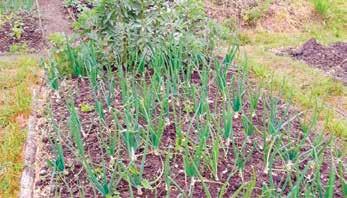
THE PRIORY Lifehouse residents have access to a large garden space, including allotments. They grow produce used in their Sunday communal meals and personal cooking. Two residents who take particular interest in the allotment say it helps their mental health and encourages them to spend time outside. One, a practising Catholic, says it brings out his inner St Francis. – RF
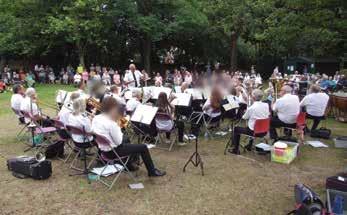
SOUTHPORT A gloriously sunny Sunday afternoon in the town’s Botanic Gardens was the perfect setting for a concert by the band. The corps distributed 200 leaflets to the appreciative audience, outlining the work of the junior sections. The varied programme included hymn tunes, classical pieces, film themes and marches. Young members of the Brass Roots learners group also took part, with enthusiastic audience participation. A great time was had by all. – PW

DORSET The division’s emergency incident vehicle provided a welfare response as firefighters responded to a wildfire. The area affected by the fire was an estimated 72 hectares, resulting in National Resilience bringing in fire services from across the country. The vehicle was on site for five days providing refreshments to responders. – IU
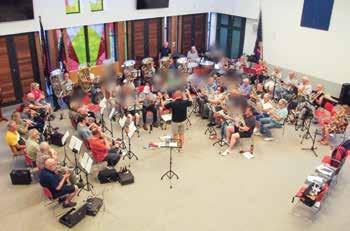
SOUTHPORT An invitation to join the band in open rehearsal led to more than 50 musicians – some of whom attended the Army for the first time – enjoying a fun evening led by International Staff Band principal cornet Bandmaster Gavin Lamplough (Birmingham Citadel). – PW

THE ambitious rewilding project launched last summer is nearing completion.
The initiative is transforming 240 hectares of the 360-hectare estate from machine-farmed land into a thriving haven for wildlife and a powerful symbol of environmental hope.
Staff and volunteers at Hadleigh Farm have seen a significant increase in the number of birds around the project area. Other significant achievements include the introduction of cattle onto the marshland, while sheep and goats have been introduced elsewhere. The hope is to attract wild fowl, winter wading birds and various invertebrates, creating the perfect conditions in time for nesting season.
Hadleigh Estate Director Ciaran Egan says: ‘We’re not just restoring land – we’re restoring balance. This is about stewardship. It’s about reconnecting with nature and creating a legacy of sustainability for future generations.’
Fencing has been put up to allow the rewilding land to establish and to maintain existing rights of way. A number of ditches and gutters have also been dug to facilitate the creation of wet grassland.
‘Probably our biggest challenge has been the management of water in the driest spring on record, trying to keep water in and ensure animal drinkers have sufficient supply,’ comments Ciaran. ‘We want the site to be an exemplar of creation care that can influence practice across the region.’
The Army has worked alongside Natural England to breathe new life into the historic site. The environmental regulator has been working for decades with local partners to conserve and enhance biodiversity within the Greater Thames Estuary and Marshes natural area where Hadleigh Farm sits. – AR
The corps supported the annual children’s activity week organised by the police. Activities included a climbing mountain and inflatable slides and rides. The corps supplied more than 600 hot drinks and more than 1,000 cold drinks from the emergency incident vehicle, as well as more than 400 free lunches for the children. It also provided a crafts activity with colouring and making a box for sweets in the shape of a cross. A big thanks to those who supported in any way. – RH

LONG EATON Fifty-three children aged four to ten years old joined Creative Creations for Bible action songs, Bible cartoons, crafts and games. Activities for older children included table football, air football, table tennis and raft building. Snacks, drinks and hot meals were provided. Young People’s SergeantMajor Emma Dove’s preparation was vital, and her enthusiastic band of helpers were kept very busy. Each child was given a copy of Kids Alive! and a warm invitation to the weekly Sunday club. We prayerfully look forward to welcoming them in coming weeks! – CH

CHIPPENHAM The corps stepped in to help parents keep children entertained, fed and safe during the summer holidays with a free holiday club. Sixteen youngsters enjoyed games, crafts and activities, including archery, a bungee run, football and a visit from a paramedic – a real-life action hero. The theme, Goat (Greatest of All Time), encompassed the Bible greats of Samson, David, Ruth and, of course, Jesus. Community Support Worker Miriam Dann-Gandy said: ‘There was a need for something for the kids, and we stepped in to fill the gap.’ There was everything from crafts to axe throwing. And all designed to give kids a space to play, make friends and explore what it means to be the Goat. – AR/SH
CLOWNE Two quintets of musicians from the corps visited members of the fellowship who currently cannot get to meetings and weekday activities. Along with readings from Psalms and songs about the Kingship of God, poetry was shared from the pen of Henry Francis. Concluding prayers were said for the two neighbourhoods. – GH

SOUTHEND-ON-SEA Major Rob Davis (Leigh-on-Sea) attended the city’s VJ Day remembrance service. Also taking part in the service was junior soldier Reuben (Leigh-on-Sea), who sang with Southend Boys’ Choir. –RD/CD
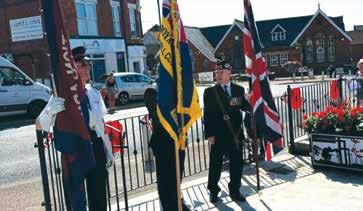
REMEMBRANCE
standard at the village VJ Day commemoration event. – GH

DUNSTABLE The band and songsters took part in a community day organised by the town council. Song sheets were distributed to enable the crowd to participate in school assembly bangers and our prayer is that they will be encouraged to think about the meaning of the hymns. Our part of the programme concluded with the crowd singing ‘Peace in Our Time’, which was particularly poignant. – JB


JOHN Haskins, Marie Godden, Sylvia Anstey and Peter Henley were welcomed as adherents by corps leaders Majors Colin and Nicola Hylton-Jones. John came to the fellowship through the monthly coffee morning, joined our Christmas Day event and lunch club and began attending worship. Marie was invited by a friend to attend and is now involved with Toddlers-on-the-Hill and the drop-in centre. Sylvia came to the lunch club and then joined John in attending worship. Peter has been attending the corps for many years and decided to make the commitment to become an adherent, supported on the day by one of his regular carers. They are pictured with Membership Secretary Kay Willetts. – HB

AS part of the corps anniversary celebrations, Mary Daniel was enrolled as a soldier and Marjorie Dempster and Chris Norton were welcomed as adherents by corps leader Territorial Envoy Martyn Coles. Chris testified that, when looking for a church, the attraction of the Army was in the faith and faithfulness of the people. Marjorie spoke of the love, acceptance and welcome she received since first attending the corps a year ago. The new members were each encouraged with Scripture and prayers of thanks for their faith journeys and commitment to God. As part of the celebrations a new pastoral care team was also appointed to support the corps and members of the community. Holding the flag is Graham Berriman. – MC

Rob Davis. –
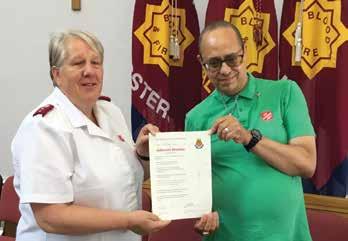
CHILDREN and Family Worker Lee was welcomed as an adherent by corps leader Captain Gayner Ward. After a few weeks in his role, Lee felt that he should worship at the Army and came along to Sunday meetings. As a result, we have been able to start a Sunday children’s church. After a couple of months, Lee felt God prompting him to become an adherent. – GW

AN important young people’s anniversary was made extra special with the enrolment of Lucas as a junior soldier by corps leader Captain Alison Hutchings. Taking a prominent part in the meeting with Brass Roots and the Kids Choir, Lucas also read about Daniel in the lions’ den and confirmed that he wants to be closer to God and connected to him. Also pictured are Michelle Crawford, who prepared Lucas for his enrolment, and Finlay holding the flag. – PW
Wedding anniversaries
Diamond (60 years)
GEOFF AND MARGARET
BARKER , Prestonpans, on 18 September
Dedicated to God
LEO DAVID JONES, son of Dean and Laura Jones, at Castleford by Captains Caron and Jon Doyle
Promoted to Glory
LORAINE HOLLAND, Whittlesey, on 15 August
CORPS SERGEANT-MAJOR
AUDREY BRIGGS, Pontefract, from her home on 26 August
Bereaved
ARTHUR HOLLAND, Whittlesey, of his wife Loraine Holland, Major Yvonne Graham, Chaplain, Lyndon House care home, of her mother
Retirements from active service
Effective 1 September
MAJOR JOY ALLCHIN (née Muskett) out of Aylsham in 1981 and last appointment Leeds West Hunslet and Yorkshire and Humber DHQ
MAJOR KENNETH GARDNER out of Rutherglen in 1995 and last appointment Grimsby and Yorkshire and Humber DHQ
MAJOR JULIE JOHNSON out of Cradley Heath in 1982 and last appointment Hospitality and Spiritual Life Support Officer, William Booth College, and Chaplain, THQ
LIEUT-COLONEL BEVERLEY
McCOMBE (née Hughes) out of Burton-on-Trent in 1983 and last appointment Secretary for Personnel, THQ
MAJOR DANIÈLE NORTON (née Polrot) out of La Villette, France, in 1983 and last appointment Chaplain, Willow House Lifehouse
MAJOR PAM PITT (née Whiting) out of Sutton in 2000 and last appointment Assistant Divisional Commander, East of England DHQ
General Lyndon Buckingham and World President of Women’s Ministries Commissioner Bronwyn Buckingham
Sat 13 Sep – Sun 14 Sep Dunstable (140th anniversary)
Mon 15 Sep – Wed 17 Sep General’s Consultative Council 60
Thu 18 Sep – Fri 19 Sep IHQ (Officers Councils and Senior Leaders Day)
Mon 22 Sep – Sun 28 Sep New Zealand, Fiji, Tonga and Samoa Territory (Congress)
Territorial Leaders Commissioners Jenine and Paul Main
Sat 13 Sep Warrington (installation of divisional leaders)
Sun 14 Sep Liverpool Walton
Tue 16 Sep – Fri 19 Sep Nottingham (Territorial Leaders’ Conference)
Sat 20 Sep – Sun 21 Sep Belfast Sydenham
Sat 27 Sep William Booth College (Welcome to the Cadets)
Chief Secretary Colonel Peter Forrest and Territorial Secretary for Leader Development Colonel Julie Forrest
Tue 16 Sep – Fri 19 Sep Nottingham (Territorial Leaders’ Conference)
Sat 27 Sep – Sun 28 Sep William Booth College (Welcome to the Cadets)
The next Environmental Champions meeting will take place online on 17 September at 2.30pm. It will focus on the 360 Carbon footprint calculator, which is an essential part of becoming registered as an Eco Church (England and Wales) or Eco-Congregation (Scotland and Ireland). If you would like to join the meeting, email environment@salvationarmy.org.uk
Family Ministries is working with Restored to build a network of Restored Beacon churches – places trained and equipped to respond to disclosures of domestic abuse and support survivors. If your corps is interested in becoming a Beacon Church, sign up for a free webinar on 25 September at restored.cademy.io or email familyministries@ salvationarmy.org.uk for more information.
Visit salvationist.org.uk/resources/key-dates/harvest to find resources to help with the build-up to your Harvest service and to support your worship service on the day.
For the International Day of Older Persons (1 October), we want to celebrate the older people in your lives who have influenced and encouraged you in your faith. If there is someone you want to tell us about, get in touch at salvationist@salvationarmy.org.uk before 22 September.
Join Salvationists across the territory in worship, with music, prayer and a Bible message from a guest speaker. This week, Captain Rob Westwood-Payne (Maidenhead) speaks about Harvest. Can’t join us at 11am on Sundays? Catch up with the weekly podcast of highlights. Each week’s broadcast is repeated in full on Sundays at 6pm, Mondays at 12am and Thursdays at 9am.
• Listen online at salvationist.org.uk/radio
Ease yourself into the day with a relaxed mix of music, chat and a few inspirational moments to stir your soul. Listen from 7am to 9am on Sundays.
• Listen online at salvationist.org.uk/radio
Get your day started with half an hour of music, prayer, a thought and lots of giggles! Listen on Saturdays from 7.30am to 8am. Can’t tune in on Saturday morning? The broadcast is repeated in full on Sundays at 9am and Mondays at 7.30am.
• Listen online at salvationist.org.uk/radio
RECRUITING NOW
AUDIT COMMITTEE MEMBER AND FINANCE COMMITTEE MEMBER (VOLUNTARY ROLES)
The Salvation Army Trustee Company – SATCo - is the corporate trustee of the trusts under which The Salvation Army operates in the UK. The Audit Committee and the Finance Committee report to, and are committees of, SATCo.
The Audit Committee, which meets four times a year, comprises four external experts with a remit that covers financial reporting, internal controls and audit, and considering reports issued by internal and external auditors and the annual financial statements.
The Finance Committee meets every other month. It is a recently established Committee with an independent chair and is advisory to the SATCo board. Its purpose is to consider the overall financial position, performance and planning of The Salvation Army in the United Kingdom and Ireland.
We are seeking two additional members for each committee; the roles are unpaid but reasonable expenses are reimbursed. Individuals must be supportive of the Christian ethos of The Salvation Army and the following demonstrable skills and expertise are required:
• A strong financial background, preferably with committee and/or board level finance experience, or experience of a leadership role in a comparable organisation of scale and complexity
• Commercial acumen
• Skills to challenge in a constructive and insightful manner
• Independent and balanced judgement
• Knowledge of risk management and statutory compliance obligations
• Understanding of risks such as safeguarding, long-term revenue generation and fraud
To apply for either of these voluntary roles, please email your CV to the Company Secretary office at Territorial Headquarters using this email: company.secretary@salvationarmy.org.uk
BELFAST CITADEL, 38 DUBLIN ROAD BT2 7HN STUDENTS... COMING TO STUDY IN BELFAST?
A warm welcome awaits you at Belfast Citadel Salvation Army!
Follow us on Facebook: The Salvation Army Belfast Citadel Follow us on Instagram: belfastcitadelsa
Coming to study in Exeter and would like to find out more about the city and Exeter Temple Corps?
Please call 01392 216553 or visit salvationarmy.org.uk/exeter-temple
HARPENDEN CORPS, LEYTON GREEN AL5 2TG INTERNATIONAL STAFF SONGSTERS
Saturday 20 September, 7pm
Festival at High Street Methodist Church, Harpenden AL5 2RU
Adults £10 | Concessions £8 | Family of 4 £25
Phone 01582 469399 or email harpenden@salvationarmy.org.uk
Sunday 21 September
10.15am worship at the hall, 2.30pm free afternoon concert
• Online discussions
• Inspiring conferences
• Territorial networks
salvationist.org.uk/events


GENESIS 1:31